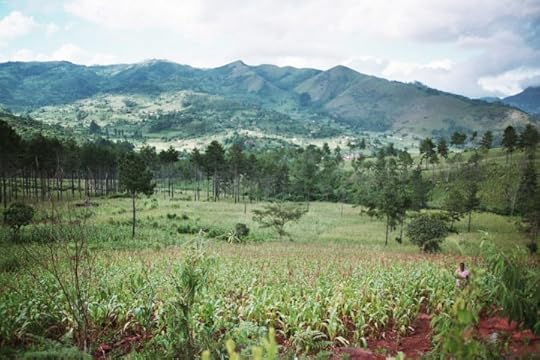Expropriation without compensation? Ask the British.

Chimanimani 2013. Image credit Ciaran Cross.
One hundred years ago,��it was the British Empire doing all the expropriating.
On 29 July 1918,��the Judicial Committee of the UK���s Privy Council��handed down its infamous ruling,��In Re Southern Rhodesia.��Lord Sumner took the occasion to offer��Britain���s��most expressly and egregiously racist justification for the land dispossession of indigenous peoples. He declared that the ���natives��� could not have had rights to land, because they were ���so low in the scale of social organization that their usages and conceptions of rights and duties are not to be reconciled with the institutions or legal ideas of civilized society.���
The court��upheld��the��expropriation of the entire��territory of Southern Rhodesia for the British Crown,��with the immortal words:�����Whoever owns the land, the natives do not������
Tomorrow, as Zimbabweans go to the polls, they continue to pay the price for that��malediction.
At the turn of the millennium, Zimbabwe underwent the most controversial��and divisive��episode of land redistribution in recent history, with��ZANU PF��sanctioning farm occupations and amending the��law��to permit expropriation without compensation.��The reasons for doing so were both real��and��opportunistic���not necessarily in that order.��Julius��Nyerere, then-President of Tanzania, warned presciently on the eve of Zimbabwe���s independence that it would be untenable ���to tax Zimbabweans in order to compensate people who took [land] away from them through the gun.�������
That���s why Zimbabwe has since 2008 put the onus of compensation for land reform on the British, a clause which was consolidated into the constitution in 2013.��After all, the British��mandated��Cecil Rhodes��� British South Africa Company (BSAC)��to invade and conquer the territory. The British continued to maintain��full oversight of the��continuing land dispossession of the indigenous population by white supremacists from 1889 through to 1965.��After the Privy Council���s 1918 decision, which��rejected��the BSAC���s claim to ownership of the��entire territory of Southern Rhodesia, the British even paid��several million pounds��in compensation�����to the BSAC.
But��now,��Zimbabwe��seems to be heading��in the opposite direction��(at precisely the moment when South Africa looks set to emulate its neighbor���s stance on��compensation). Front-runner for President,��Emmerson��Mnangagwa,��keen to lay the foundations for the country���s re-integration into the international economic order,��has committed to compensate the former landowners.
Only, slapping a��retrospective billion-dollar price tag on former President Robert Mugabe���s��land reform program is not something to celebrate���however much one dislikes��him. It��will not make the past less violent or shambolic, or help restore��a sustainable and equitable��agricultural��sector.
For the incoming government��in Harare,��it could cost. A lot.
Zimbabwe is still seeking to have annulled��two Awards��issued by a tribunal of the International Centre for the Settlement of Investment Disputes (ICSID).��The��disputes concern��the government���s expropriation of��timber plantations which were first established by Rhodes��� BSAC.��One might��think��that��the former property��of��the��poster-boy of British imperialism��would be just the ticket for redistribution��in a formerly colonized��state��vying for land reform to complete its path to independence. Right?��Think again.
Indigenous��communities squatting on the plantations are still waiting for formal resettlement, eighteen years after Zimbabwe���s ���fast-track��� land reform kicked off. Some of them��can��remember being forcibly removed from��their��ancestral lands and into native compounds, after the land was taken by the BSAC. The company���s��pine trees��were��planted on the sacred sites and burial grounds of their ancestors, which these communities have maintained over generations, despite having no legal title.
What makes the ICSID��proceedings��so��abhorrent is��not��merely��that the government has��not said one��word in those��communities��� defense. It is��that the arbitrators�����treatment of��the��indigenous communities�����claim��is��as flagrantly racist as that of the Privy Council in 1918.
The communities�����appeal to participate in the case in 2012��was flatly rejected by the��tribunal. Their rights as indigenous peoples under international law to collective ownership and usufruct of their traditional lands, as well as their collective right to consultation, were deemed irrelevant.
And��in��the��final award,��the arbitrators��have��dubbed��these communities ���The��Invaders.���
Meanwhile��they awarded��the Swiss-German investors nearly $200million.��Actually, that���s roughly the present-day equivalent of what the British compensated the BSAC.��But the tribunal��doesn���t want Zimbabwe to pay. Its preferred alternative would be much cheaper. Ideally��the expropriations��should��be reversed and the properties returned to the��investors.��To achieve that��the tribunal called on��both��disputing parties (the state and the company) to��facilitate the invasion��of the indigenous communities��� lands���to burn their crops and homes, and remove them by force if necessary���in the name of white European capital. Again.
Sean Jacobs's Blog
- Sean Jacobs's profile
- 4 followers



